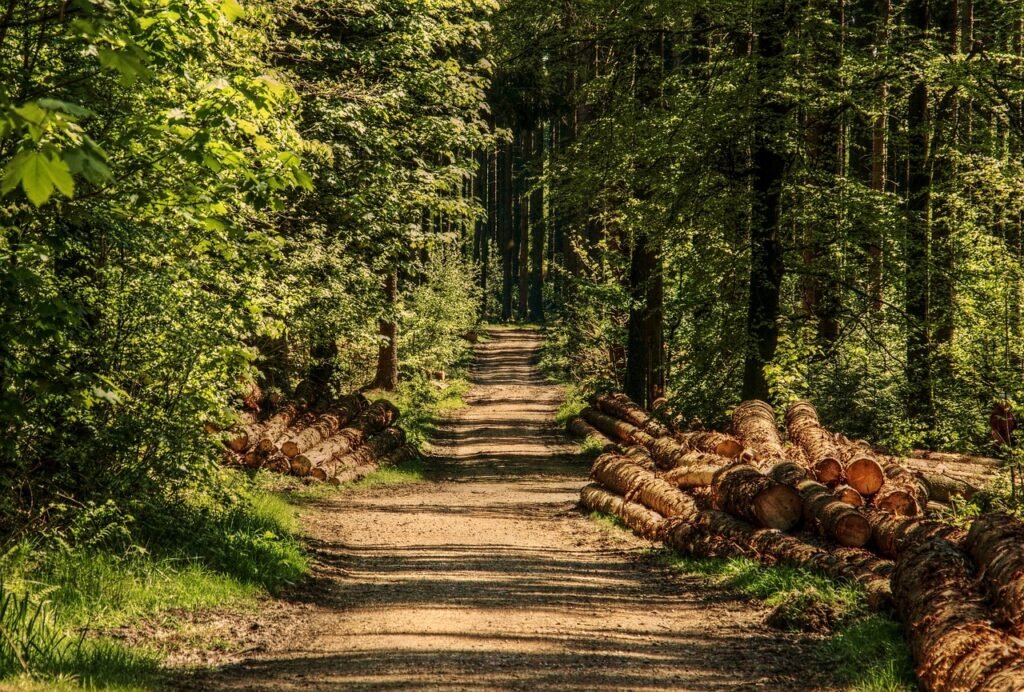When you head out into the wilderness, whether it’s a day hike through the Maine woods or a multi-day backcountry excursion, preparation is key. As a career game warden and lifelong outdoorsman, I’ve seen the difference that having the right tools can make. They can transform a potentially dangerous situation into a manageable one and turn what might have been a stressful outing into a truly enjoyable experience. Here, I want to share with you the everyday carry (EDC) tools that I believe every adventurer should have on hand to boost both their confidence and their capabilities in the wild.
Before diving into specific tools, it’s important to understand why EDC is so crucial in the wilderness. EDC items are tools that you carry with you every day because they provide you with the essential functions that you might need at a moment’s notice. In the wilderness, these tools aren’t just convenient—they can be lifesaving.
The wilderness is unpredictable. Weather conditions can change rapidly, injuries can occur, and navigation can become challenging. By carrying a well-thought-out selection of EDC tools, you’re preparing for the unexpected, giving yourself the best chance to handle any situation that comes your way. This preparation doesn’t just increase your safety; it boosts your confidence, allowing you to enjoy your adventure without constantly worrying about what might go wrong.
Must-Have EDC Tools for Wilderness Adventures
Survival Water Straw
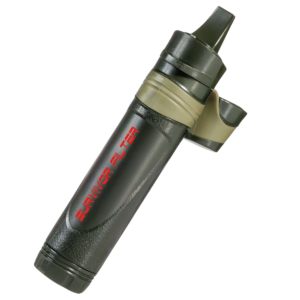
Water is the most critical resource in the wilderness. Dehydration can set in quickly, especially during strenuous activities, and drinking untreated water from streams or lakes can lead to serious illnesses due to bacteria, parasites, and other pathogens. That’s where the survival water straw comes in.
A survival water straw is a portable water filter that allows you to drink directly from any water source. This small, lightweight device filters out 99.9% of waterborne bacteria and protozoa, making it safe to drink. The beauty of the survival straw is its simplicity and reliability—no need for pumps, tablets, or batteries. Just place the straw in the water and drink.
From my experience, this tool is indispensable. Whether you’re on a day hike and forgot your water bottle or you’re on a multi-day trek and your water purification system fail, the survival water straw can be the difference between a minor inconvenience and a potentially life-threatening situation.
EDC Knife
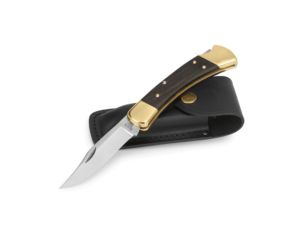
A knife is arguably the most versatile tool you can carry in the wilderness. From cutting rope to preparing food, building shelters, or even defending yourself, a good knife is indispensable.
For everyday carry, I recommend a folding knife with a locking blade mechanism. An example of one I would recommend is the 110 Folding Hunter® Knife. This ensures that the blade won’t accidentally close on your hand while you’re using it—a critical safety feature. Look for a knife with a blade length of around 3-4 inches; this size is large enough to handle most tasks but small enough to be easily portable.
As a game warden, I’ve relied on my knife in countless situations. Whether it’s cutting a fishing line tangled in the brush, skinning game, or carving a fire stick, a good knife has always been at my side. I prefer a knife made of high-quality stainless steel to resist rust and corrosion, which is especially important in the humid and often wet conditions of the Maine wilderness.
Firestarter Kit
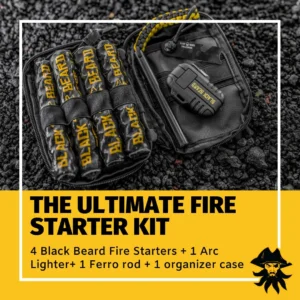
Fire is essential in the wilderness for warmth, cooking, and signaling for help. While matches and lighters are good to have, they can fail in wet or windy conditions. That’s why a reliable firestarter kit is an essential part of your EDC. A kit like The Pirates Plunder – Fire Starter Kit or similar is great.
A ferrocerium rod and striker is a firestarter I’ve come to trust. It’s a simple, lightweight tool that works by scraping the striker against the rod to produce sparks that can ignite tinder. Unlike matches or lighters, a ferro rod will work even when wet, and it can produce thousands of strikes over its lifetime.
Alongside the firestarter, I always carry a small, waterproof container of tinder—cotton balls soaked in petroleum jelly are an excellent choice. With this setup, I know I can get a fire going in almost any conditions, which brings peace of mind when the temperature drops or when I need to cook a meal after a long day in the field.
Compass and Map

While GPS devices are great, batteries can die, and electronics can fail. That’s why I always carry a traditional compass and a topographic map of the area I’m exploring. Knowing how to read a map and navigate with a compass is a skill that every outdoorsman should master.
A quality compass with a rotating bezel and sighting mirror will allow you to take accurate bearings and navigate even in dense forests or over rough terrain. Coupled with a detailed map, this tool allows you to plan your route, avoid obstacles, and find your way if you become disoriented.
I’ve seen too many people rely solely on GPS and end up lost when their device fails. By carrying and knowing how to use a map and compass, you’re not just adding a tool to your kit—you’re adding a critical skill that could save your life.
EDC Leather Products
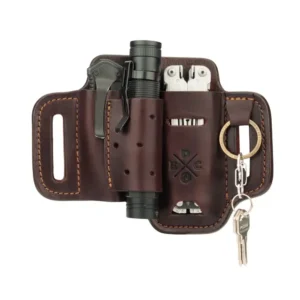
Leather goods might not be the first thing that comes to mind when you think of wilderness tools, but they offer durability, functionality, and a touch of traditional craftsmanship that I appreciate as an outdoorsman.
One of my favorite EDC items is a high-quality leather belt. A good leather belt does more than just hold up your pants—it can be used as a tourniquet, a strap to secure gear, or even as a strop to sharpen your knife. The natural durability of leather makes it an excellent choice for the outdoors, and with proper care, it will last a lifetime.
I also carry a leather sheath for my knife and a leather wallet. These items aren’t just about style—they’re about reliability. Leather resists wear and tear far better than synthetic materials, which is why I prefer it for everyday carry in the wild. A tool belt organizer that I personally use and highly recommend is 1791 Everyday Carry Easy-Slide with Large Flex Loop: for Medium Multitools.
Multi-Tool
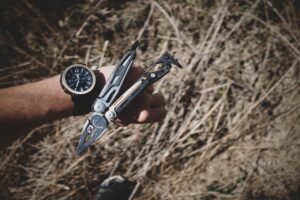
A multi-tool is like having a toolbox in your pocket. With a good multi-tool, you have access to pliers, screwdrivers, scissors, a small saw, and more—all in one compact package.
For EDC, I recommend a multi-tool that includes a sturdy knife blade, pliers, and a selection of screwdrivers. These tools cover most of the common tasks you might encounter, from fixing gear to making minor repairs on the trail.
As a game warden, I’ve used my multi-tool for everything from fixing equipment in the field to removing hooks from fish. It’s a tool that’s saved me time and hassle on countless occasions, and I never head into the wilderness without it.
Safety First: Anticipating What Could Go Wrong

In the wilderness, anticipating what could go wrong is as important as the tools you carry. It’s not about being pessimistic—it’s about being prepared. The tools I’ve mentioned are all designed to help you handle common challenges, but it’s your mindset that will ultimately determine how you use them.
Always let someone know your plans before heading out, carry extra supplies, and know your limits. By combining the right EDC tools with a cautious, well-prepared approach, you can turn any wilderness adventure into a safe and enjoyable experience.
Remember, the wilderness is a place of beauty and serenity, but it demands respect. With the right tools and a mindset of preparedness, you can explore with confidence, knowing that you’re ready for whatever the wild might throw at you.
So pack your gear, head out into the woods, and enjoy the adventure—safely and confidently.

